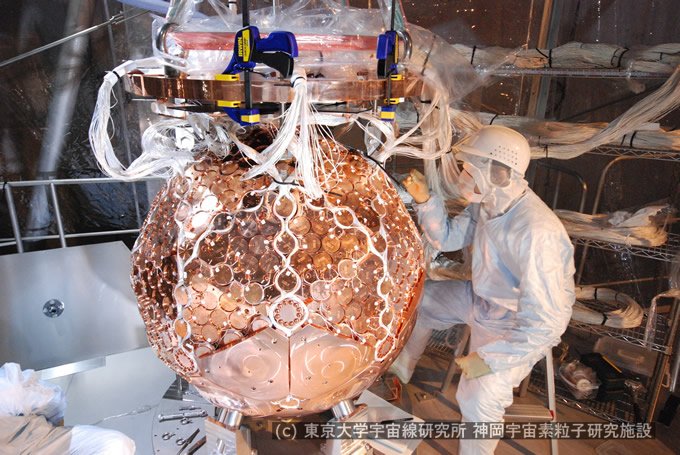XMASS collaboration, led by Yoichiro Suzuki at the Kavli IPMU, has reported latest results on warm dark matter search. Their results rule out the possibility that super-weakly interacting massive bosonic particles (Bosonic super-WIMPs) constitute all dark matter in the universe. This result was published in September 19th issue of the Physical Review Letters as an Editors’ Suggestion.
 Construction of XMASS-Ⅰ detector (2010/Feb./25) (C) Kamioka Observatory, ICRR(Institute for Cosmic Ray Research), The University of Tokyo
Construction of XMASS-Ⅰ detector (2010/Feb./25) (C) Kamioka Observatory, ICRR(Institute for Cosmic Ray Research), The University of Tokyo
The universe is considered to be filled with dark matter, which cannot be observed by ordinary light. Although much evidence supports the existence of dark matter, it has yet to be directly detected and its nature is not understood.
Various theoretical models have been proposed to explain the nature of dark matter. Some models extend the standard model of particle physics, such as super-symmetry, and suggest that weakly interacting massive particles (WIMPs) are dark matter candidates. These models have motivated most research on experimental dark matter. In discussions on the large-scale structure formation of the universe, these WIMPs fit the cold dark matter (CDM) paradigm.
On the other hand, some simulations based on the CDM scenario predict a much richer structure of the universe on galactic scales than those observed. Furthermore, high-energy collider experiments have yet to provide evidence of super-symmetric particles. These facts have increased the interest in lighter and further weakly interacting particles such as bosonic super-WIMPs as dark matter. Super-WIMPs with masses greater than a twentieth of an electron (more than 3 keV) do not conflict with the structure formation of the universe.
“Bosonic super-WIMPs are experimentally attractive since if they are absorbed in a ordinary material, they would deposit energy essentially equivalent to the super-WIMP’s rest mass,” Suzuki says. “And only ultra-low background detectors like XMASS can detect the signal.”
The XMASS experiment was conducted to directly search for such bosonic super-WIMPS, especially in the mass range between a tenth and a third that of an electron (between 40 and 120 keV). XMASS is a cryogenic detector using about 1 ton of liquid xenon as the target material. Using 165.9 days of data, a significant excess above the background is not observed in the fiducial mass of 41 kg. The absence of such a signal excludes the possibility that bosonic super-WIMPs constitute all dark matter in the universe.
“Light super-WIMPs are a good candidate of dark matter on galactic scales,” Professor Naoki Yoshida, a cosmologist at the School of Science, the University of Tokyo and a Project Professor at the Kavli IPMU says. “The XMASS team derived an important constraint on the possibility of such light dark models for a broad range of particle masses.”
Publication
- Search for Bosonic Superweakly Interacting Massive Dark Matter Particles with the XMASS-I Detector
Physical Review Letters 113, 121301 (2014) (Publication date: September 18, 2014)
DOI: 10.1103/PhysRevLett.113.121301 - Abstract (Webpage of the Physical Review Letters)
- Preprint (Webpage of the arXiv.org)
Links
PIO Contact
Marina Komori, Kavli Institute for the Physics and Mathematics of the Universe, The University of Tokyo
+81-4-7136-5977 (office), press_at_ipmu.jp
Aya Tsuboi, Kavli Institute for the Physics and Mathematics of the Universe, The University of Tokyo
+81-4-7136-5981 (office)
Contacts
Yoichiro Suzuki
Kavli Institute for the Physics and Mathematics of the Universe, The University of Tokyo
E-mail: yoichiro.suzuki_at_ipmu.jp
ABOUT KAVLI IPMU
Kavli IPMU (Kavli Institute for the Physics and Mathematics of the Universe) is an international research institute with English as its official language. The goal of the institute is to discover the fundamental laws of nature and to understand the Universe from the synergistic perspectives of mathematics, astronomy, and theoretical and experimental physics. The Institute for the Physics and Mathematics of the Universe (IPMU) was established in October 2007 under the World Premier International Research Center Initiative (WPI) of the Ministry of Education, Sports, Science and Technology in Japan with the University of Tokyo as the host institution. IPMU was designated as the first research institute within Todai Institutes for Advanced Study (TODIAS) in January 2011. It received an endowment from The Kavli Foundation and was renamed the “Kavli Institute for the Physics and Mathematics of the Universe” in April 2012. Kavli IPMU is located on the Kashiwa campus of the University of Tokyo, and more than half of its full-time scientific members come from outside Japan.
Kavli IPMU Website - http://www.ipmu.jp/






